Humanities & Social Sciences
Mak Celebrates the International Mother Language Day: Families, Language Experts & Policy Makers Called to Harness & Promote African Languages
Published
1 year agoon
By
Jane Anyango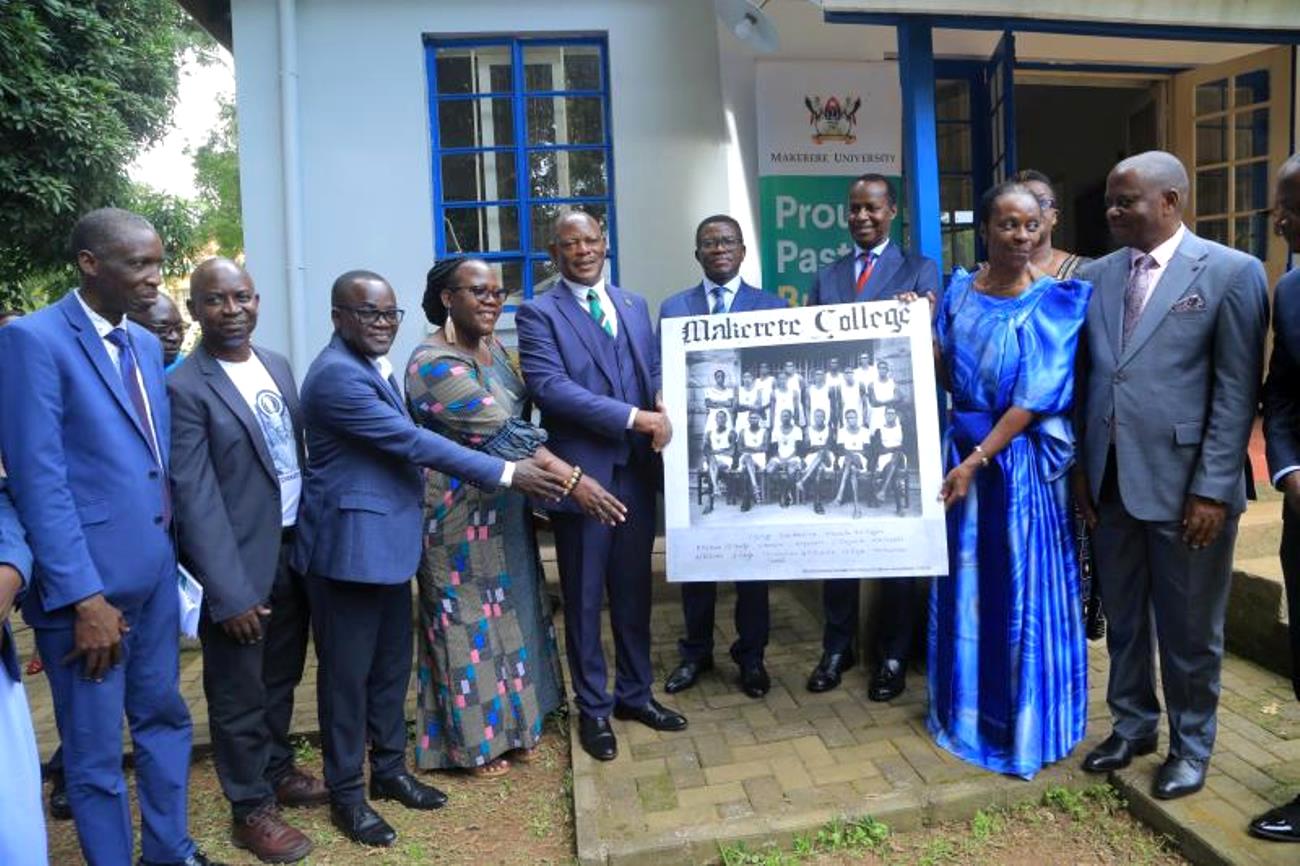
Makerere University through the Department of African Languages, School of Languages, Literature and Communication on 21st February 2024 joined the rest of the world to celebrate the International Mother Language Day. This day is observed every year to promote linguistic and cultural diversity and multilingualism.
The celebrations started with the official opening of the Sir Edward Muteesa II Museum at Makerere University in the morning. Sir Edward Muteesa II was the 35th Kabaka of Buganda and the first President of the Republic of Uganda, and an alumnus of Makerere University. Sir Edward Muteesa II Museum is located at Makerere University, Quarry Road, Plot 95. This site was the on- campus private residence of Sir Edward Muteesa II when he was a student of Literature at Makerere from 1943 to 1945.
The International Mothers Language Day ceremony was held in the afternoon on the major theme, “Different Languages, One People: Celebrating and Harnessing Uganda’s Linguistic and Cultural Diversity,” while the days’ Sub-theme was, “Harnessing Cultural Diversity for Social and Economic Development”
The inauguration of the Museum and the celebrations to mark the International Mother Language Day were presided over by the Kabaka of Buganda represented by the Nnaalinnya – Agnes Nabaloga at the Yusuf Lule Auditorium. Nnaalinnya was accompanied by the Katikkiro Owek. Charles Peter Mayiga. The Vice Chancellor, Makerere University Prof. Barnabas Nawangwe, Ministers and the royal family members from Buganda Kingdom, Members of University Council and top Management, Principals, Deans and Heads of department, Students’ leaders and the Nkoba Zamboggo Students’ Association and the academic fraternity graced the occasion.
Multilingual Education is a pillar for Inter- Generational Learning, says the Kabaka
While delivering Kabaka’s message, Nnaalinnya hailed the School of Languages, Literature and Communication for collaboratively organising the 2024 celebration with the Nkoba Zamboggo Students Association.
As custodians of culture that cherishes and endeavors to protect and develop its own mother language (Luganda), Nnaalinnya thanked the nation of Bangladesh which initiated the idea of celebrating mother languages at the international level. This idea she reported, was embraced and promoted by UNESCO in 1999 and, has been celebrated since then.
In line with the theme of the conference, Nnaalinya said, multilingual education is a pillar for inter- generational learning which rhymes appropriately with country’s pillars, contexts and environment which is multicultural and multilingual.
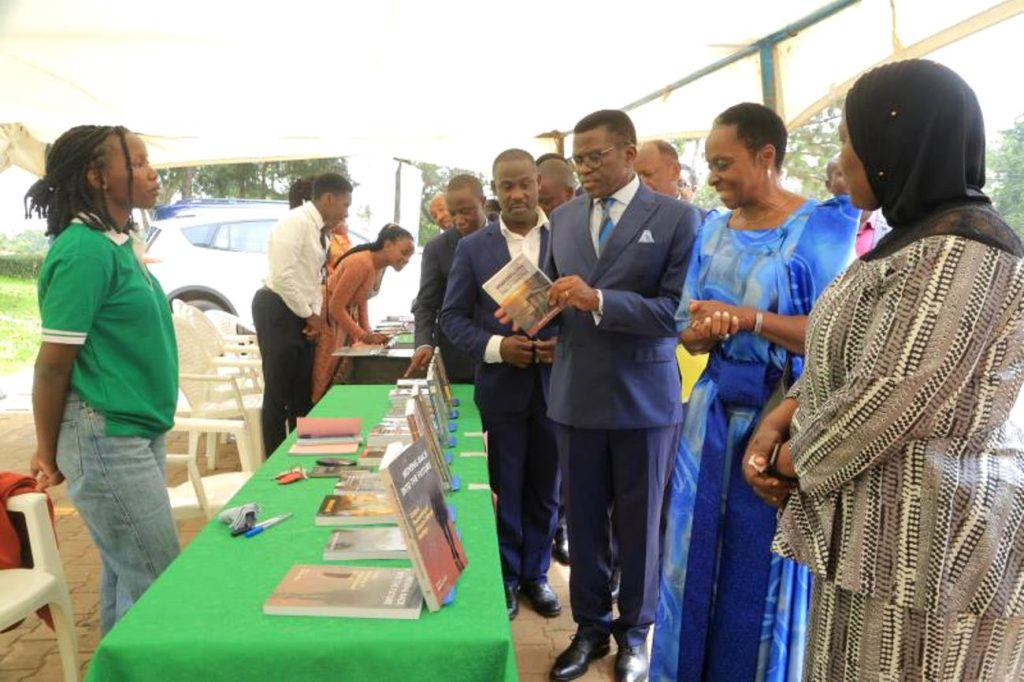
Nnaalinnya also applauded the chosen theme, “Different Languages, One people: Celebrating and Harnessing Uganda’s Linguistic and Cultural Diversity” which brought the celebration of the day closer to home.
“The two themes are worth celebrating with the pomp and seriousness they deserve. Even more importantly, am very encouraged to know that youth represented by Makerere University Nkoba Zamboggo Students Association have played an active part in the organisation of the event.” She said.
She noted that such participation of the youth guarantees the promotion, protection and promotion mother languages for the preservation and transmission of traditional knowledge and cultures in a sustainable manner.
She also noted with joy that, this year’s celebration coincides with the commemoration of the Nkoba Zamboggo 34 years of existence and activity which was active in the difficult years of the 1960s.
Prioritise your mother languages and learn other languages –The Katikkiro of Buganda
The Katikkiro of Buganda Charles Peter Mayiga advised on the need to prioritise mother tongues and to learn other languages.
Mayiga said, learning a language is resourceful and that while prioritising own mother tongue, it is important to learn other languages.
“To promote mother languages is to acknowledged diversity. Our diverse heritage should be seen as the foundation of the modern African states. Every time we neglect or relegate our mother tongues, we inadvertently ignore the similarities of our different nationalities.” He said.
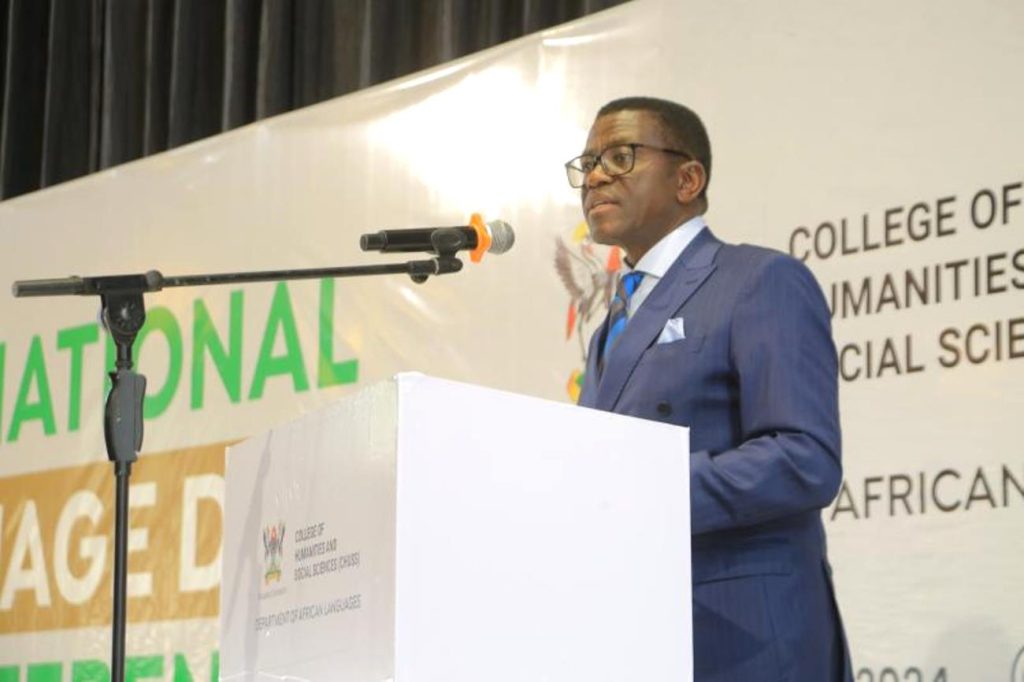
The Katikkiro expressed the need to acknowledge similarities to help build consensus noting that ,consensus is the true and genuine source of national unity.
He commended the university administration for restoring the former residence of Ssekabaka Edward Mutesa II and for turning it into a museum.
“A people that ignore their history can learn nothing from their experiences and that is one of the sources of constant turbulence in the world”, He said.
Makerere can only be stronger if Traditions, Culture and Heritage are Embraced – Prof. Barnabas Nawangwe
The Vice Chancellor Makerere University Prof. Barnabas Nawangwe stressed that Makerere can only be stronger if all embrace traditions, culture and heritage.
Nawangwe said the university was honored to host two important celebrations namely, the opening of the Muteesa II Museum at Makerere and hosting the international mother languages day.
“This is a historic event in our university. Kabaka Muteesa was a student at Makerere University when he was already king and that alone, is a such a big honor for us and, we must indeed be proud of that. That is why we have honoured his legacy by making the house where he stayed a museum.
“That museum is invaluable for all of us in Uganda and, I invite all Ugandans and visitors to come and witness the history of our first president of this country and one of the leaders in the struggle for independence”. The Vice Chancellor emphasised.
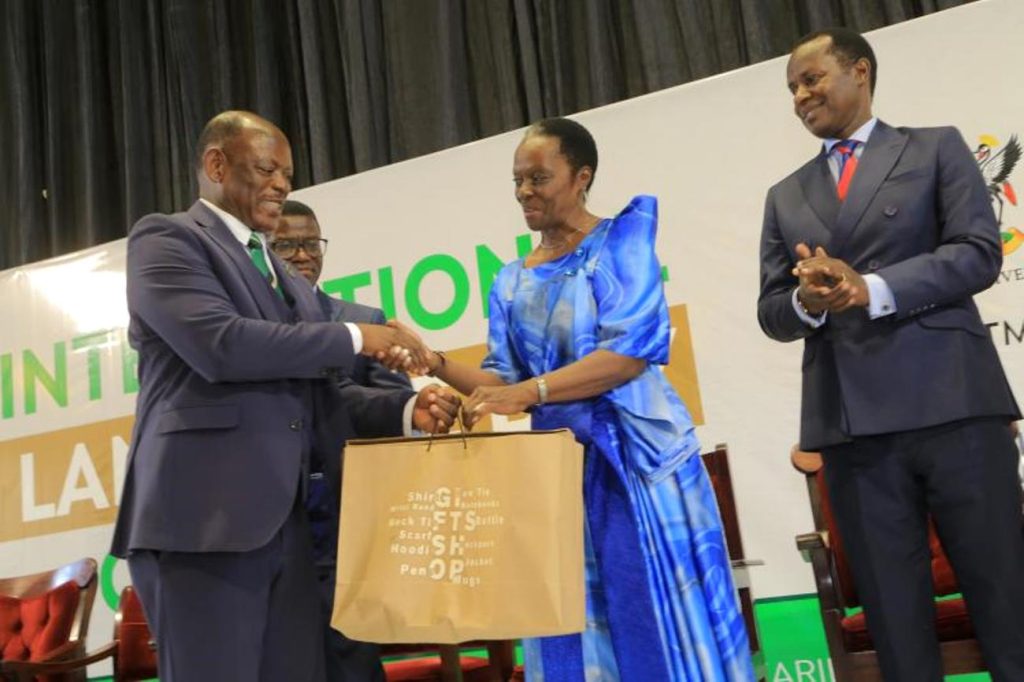
The Vice Chancellor appreciated the Buganda Kingdom for gracing the occasion when the university is celebrating the World’s Mother Language Day.
“There could not have been a better choice than inviting one of the cultural leaders in this country to officiate at this event and, I want to congratulate you Principal, Dean and Head of department for that vision of putting events properly in context”. Prof. Nawangwe appreciated.
The Vice Chancellor said he had picked a number of lessons from the various speakers and challenged to write his memoirs when he retires in Lugwe, then have it translated in English by others.
“But we are privileged this morning to have these important visitors to honour these two events at Makerere University, please send our highest regards to His Royal Highness the Kabaka”, Nawangwe said.
The Principal College of Humanities and Social Sciences Prof. Josephine Ahikire expressed the need for Ugandans to value their mother tongues on grounds that the African culture had the power to correct men and women adding that, there is so much to learn and put in practice.
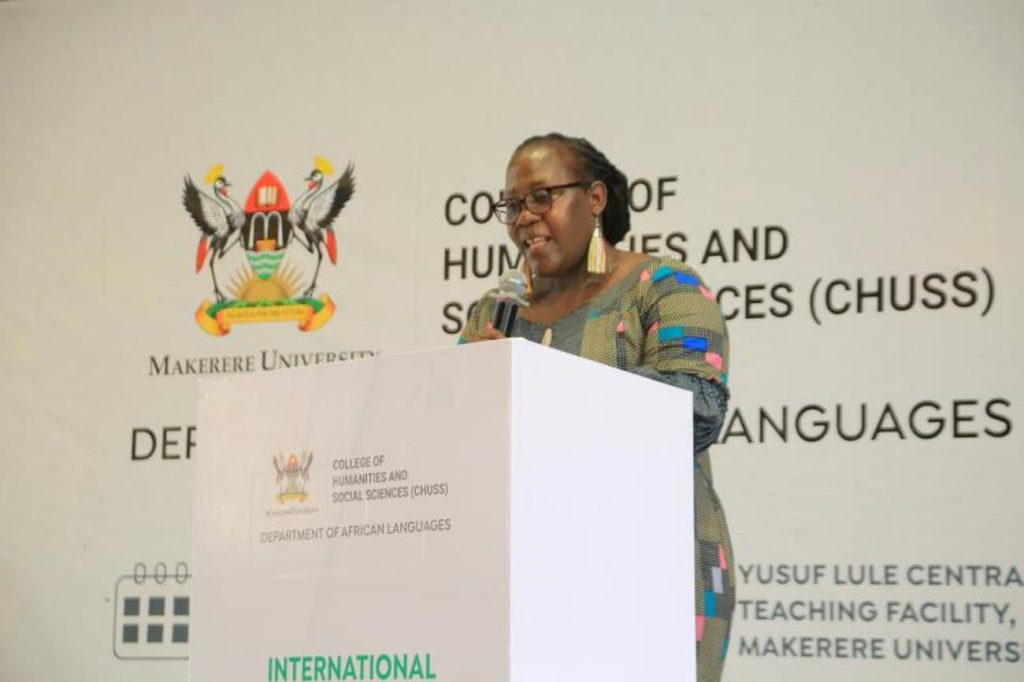
Prof. Ahikire also noted that language is needed as a powerful instrument of connection, and teaching one another with respect that expresses our political and social state of humanness.
The Principal applauded the Buganda kingdom for the initiatives that have deepen knowledge in culture among students and staff.
Language experts called to translate, write and publish in mother tongues
In his Keynote address on the Linguistic and Cultural Landscape of Uganda Prof. Manuel Muranga said, all human beings are potentially at their most effective, their most creative, their most comfortable when using their mother tongue or first language.
“The language one spoke as an infant and grew up in, matters. It is possible to learn to write in a dominant language in one’s neighbourhood, rather than writing in one’s own, but to learn to speak that language in lieu of one’s own involves a painful death to self, a sort of denial of one’s linguistic identity”. Muranga stated.
Because of the strength of inspiration and the energy of creativity that comes from this relationship to one’s mother tongue or first language, Prof. Muranga called on language experts to start writing and publishing in their mother languages.
To harness linguistic diversity, Muranga challenged language experts and educational institutions to have as many books as possible produced in the mother tongues through direct authorship in those mother tongues and through translation into them.
“We need to say “Yes!” to a phase in our lives of adventure and experiment with our mother tongues. It will get us somewhere. The harnessing of our mother tongues, each one of his or her own, begins right here: at the point where we, especially university dons in language, literature and communication, get a pen and begin to write a letter, a story, a translation or whatever, in the mother tongue”, Prof. Muranga advised.
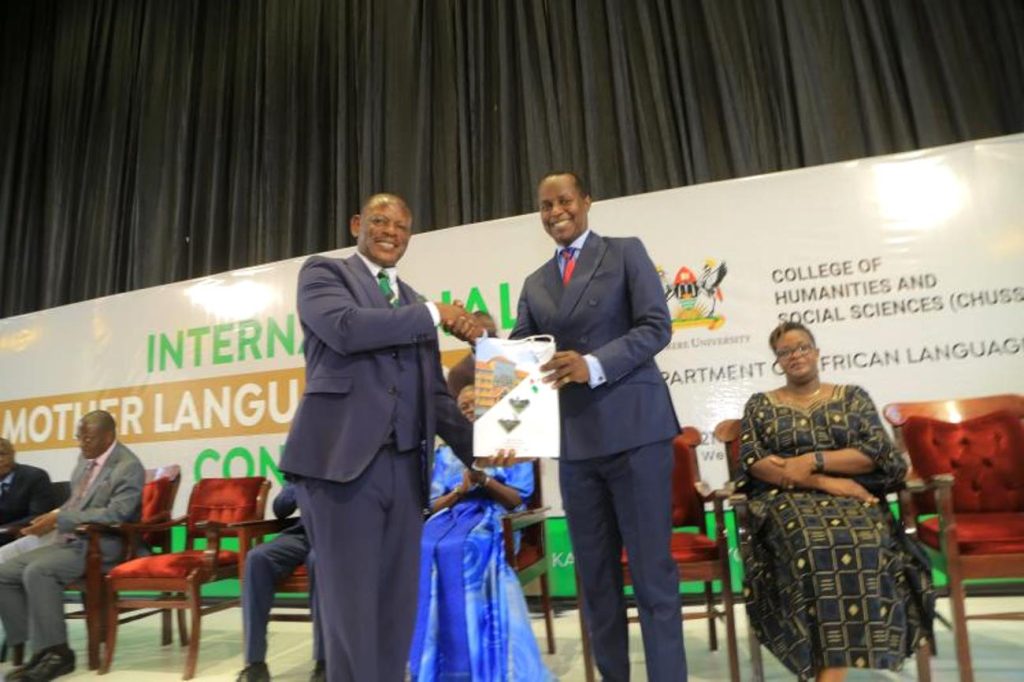
At the same time, Prof. Muranga also advocated for writing in one’s mother tongue on the linguistically standardised foundations of orthography that should be encouraged and even deliberately cultivated by cultural leaders and educationists. These he said, would entail sms’s and WhatApp messages, email and other types of letters, poems, short stories, long stories, biographies and autobiographies); novels, plays, newspaper articles, sermons etc. in good, interesting language.
Muranga also advocated for the use and promotion of mother languages in families especially the young, upper class and in some cases middle class, urban families, and from educated ethnically mixed marriages, whose first and strongest language is our Ugandan English.
“But we should also have textbook writers in all the academic disciplines writing in the mother tongue: Chemistry, Biology, Physics, History, Geography, Economics, Law etc. in the mother tongue. We need M.A.s and Ph.D.s that consist in the main in the production of, for example, a modern Biology or Mathematics textbook in Luganda, Lugbarati or Lukonzo through translation”. The professor stressed adding that:
“When I was in S.2 we had a textbook of Chemistry by an author called Atkinson; it was, of course, in English. I never understood the concept of valence and even today I don’t understand it. Can someone explain it to me in simple English or, preferably, in Rukiga or Luganda? A person doing an M.A. in translation would explain to us what valence is and would propose a viable, or at least debate-provoking rendering for it in his or her mother tongue.
That kind of work, should be happening in our universities. An interdisciplinary M.A. and M.Sc. in Translation would produce for us disseminators of knowledge and tools for the implementation of a tri-lingual (Mother Tongue, English and Swahili in that order) education policy which I advocate for”. Muranga stated.
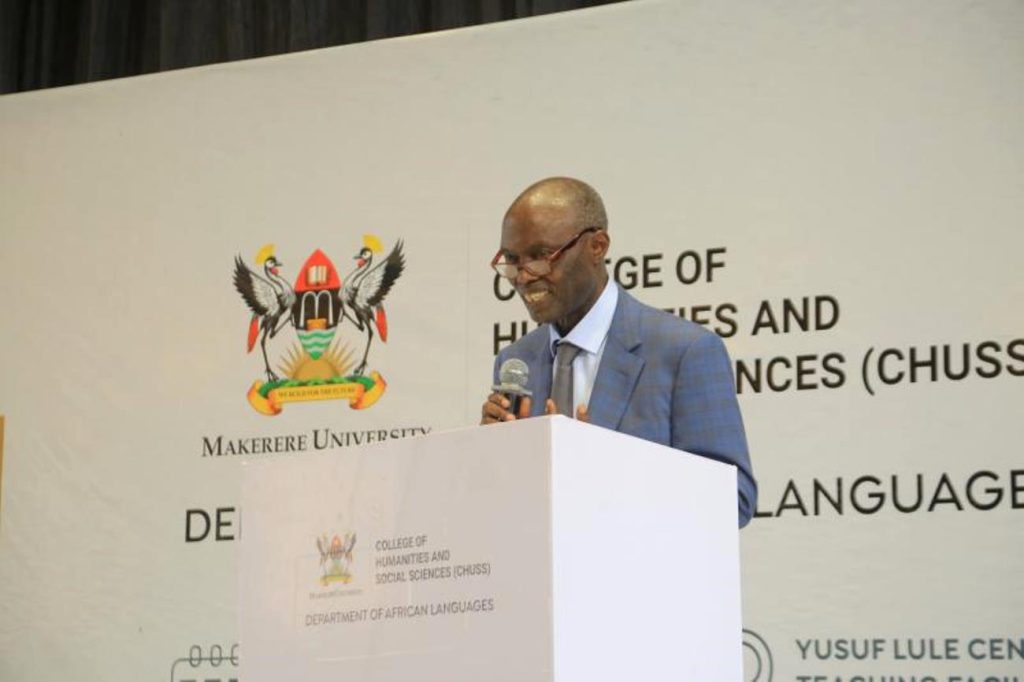
Benefits from linguistic and cultural diversity
Speaking on Advantages of linguistic and cultural diversity prof. Muranga noted that the entire world’s fabric is diversity. Diversity according to the professor, is part and parcel of nature’s design, just as there are no two people who are 100% alike even when they are identical twins, so each human being has his or her own way of speaking, his or her idiolect.
He explained that multilingualism in Uganda and worldwide can, if positively embraced, lead to a language and language-based cultural industry being built around, for example, each single one of the 65 languages of Uganda and the 2080 or so languages of Africa. If this has happened in Europe, Prof. Muranga argued, then it can also happen in Africa- but it takes conviction and linguistic patriotism on the part of the speakers of these languages. If such patriotism is absent, those languages will die within a few generations of the descendants of the present-day speakers.
Prof. Muranga highlighted some of the advantages of linguistic and cultural diversity as follows:
- Sharing the culture around each of these languages can be great educational fun and can also create jobs. This sharing is, again, primarily the work of translators and interpreters. There were, as of August 2022, approximately 640,000 translators in the world. Interpreters’ statistics are harder to determine but there were in the USA alone in 2023, 52,000 interpreters and translators.
- The freedom to be creative in your mother tongue or first language is something very precious – indeed the entire freedom to access education in the mother tongue from elementary school to university is one of the principles of international justice as propounded by UN and UNESCO. Great poets and writers in general are those who write in their mother tongues (cf. Johann Gottfried Herder’s {1744-1803} essay entitled: “A true poet is one who writes in his own language”.) But it takes practice to be good even at writing in one’s mother tongue. It does not come automatically – and even I at my age I am still learning.
- Those who embrace linguistic and cultural diversity embrace world citizenship, or cosmopolitanism, at the same time; they overcome ethnocentrism. And cosmopolitanism harmonises well with a central Christian doctrine as stated in Galatians 3:28, which suggests that you cannot be a true Christian and at the same time a tribalist or a racist; the two are incompatible.
- Cultural diversity promotes tourism both domestic and interethnic/international, creating opportunities for a healthy enjoyment of positive human life and creative talent in all its variegation as music, dance, drama, poetry, architecture, engineering, indigenous knowledge, etc. Imagine we had an income-generating ethno-historical museum and a cultural centre at the headquarters of each of the 136+ districts of our current Uganda. I would like to urge the parliamentarians to vie for this kind of development.
Disadvantages:
- Linguistic and cultural diversity can be rather costly. Yet if the economy of a multilingual nation is well managed, the income from the diversity can cover the cost, yielding profits and benefits.
- Working through translators and interpreters is not direct conversation face to face and ear to ear. Something gets lost in the process of transfer.
- Some uncouth, ethnocentric minds in a multilingual and multicultural nation might be tempted to exploit linguistic and cultural diversity for secessionist ends, instead of for cosmopolitan ones. But such narrow-minded people are doomed to failure, for even in a family unit of two parents and three children, there can be division and even secession. A monolingual or even culturally homogeneous situation in a country does not guarantee harmony and peace. Look at Somalia; and remember Rwanda.
Language, as a symbol of identity, vehicle for communication, a pillar for social integration, education and development, Dean SLLC
The Dean School of Languages, Literature and Communication Assoc. Prof. Saudah Namyalo explained that the International Mother Language Day is a worldwide annual observance held on 21st February to promote awareness of linguistic and cultural diversity which exists in many communities.
The day was first announced by UNESCO on 17 November 1999, and it was formally recognized by the United Nations General Assembly with the adoption of UN resolution in 2002. The International Mother Language Day is part of a broader initiative “to promote the preservation and protection of all languages used by peoples of the world”.
Although languages,are a symbol of our identity, a vehicle for communication and a pillar for social integration, education and development, Prof. Namyalo observed that due to globalization processes, they are increasingly under threat, or disappearing altogether.
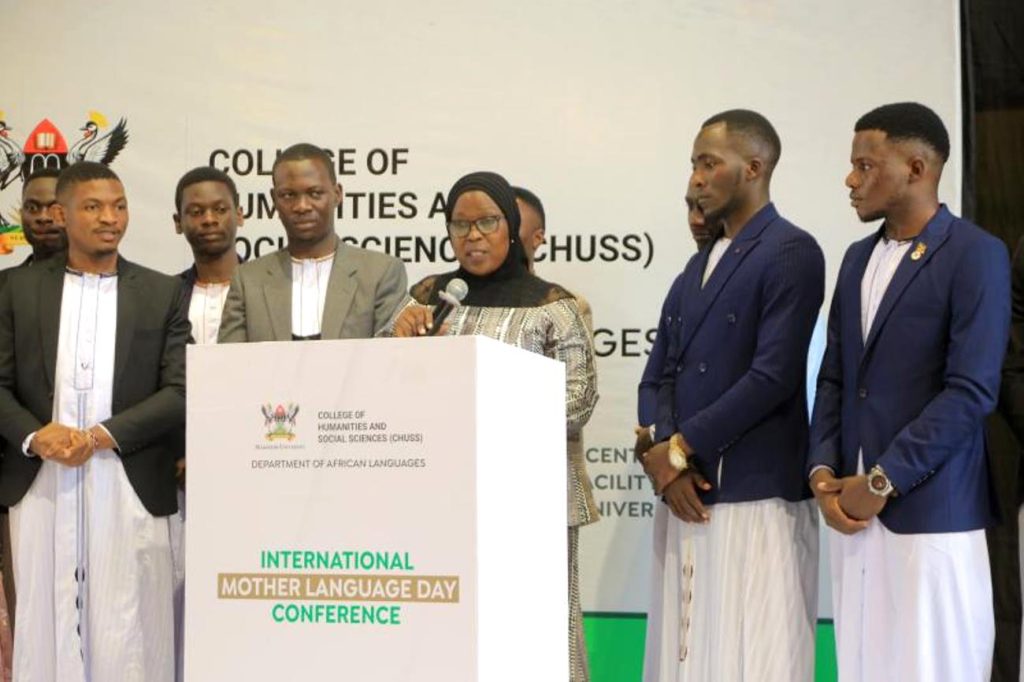
“Every two weeks a language disappears or dies. When a language dies, it takes with it an entire cultural and intellectual heritage. Not only that, we also lose perspectives, ideas, opinions and most importantly, we lose a unique way of being human.Opportunities, traditions, memory, unique modes of thinking and expression which are valuable resources for ensuring a better future also lost. Sadly, close to 45% of the estimated 7000 languages spoken in the world are endangered, threatened or near extinction. Only a few hundred languages have genuinely been given a place in education systems and the public domain, and less than a hundred are used in the digital world.” Prof. Namyalo observed.
Namyalo called on participants to reflect, understand and appreciate that although Ugandans are diverse in terms of the languages and cultures they possess, they are one.
She explained that Africa’s divisive seed was planted with the advent of colonialism and the Berlin Conference that gave Africa its modern states. The artificial borders and the dirty politics that ensued according to the professor, made people think that they are different.
The present ethnic emblems according to Dean Namyalo, are more of geographical markers than distinct cultural entities. For instance, she said, one is a Musongora because they come from Busongora.
“Today, we recognize over 50 ethnic groups, but we need to be political about this and invest in our history in order to cement our rootedness and recognise the bonds that hold us together. Unless we understand the importance, of unity in diversity and stop giving lip service to multiculturalism we shall continue to see new kingdoms and ethnic groups emerging”, Dean Namyalo warned.
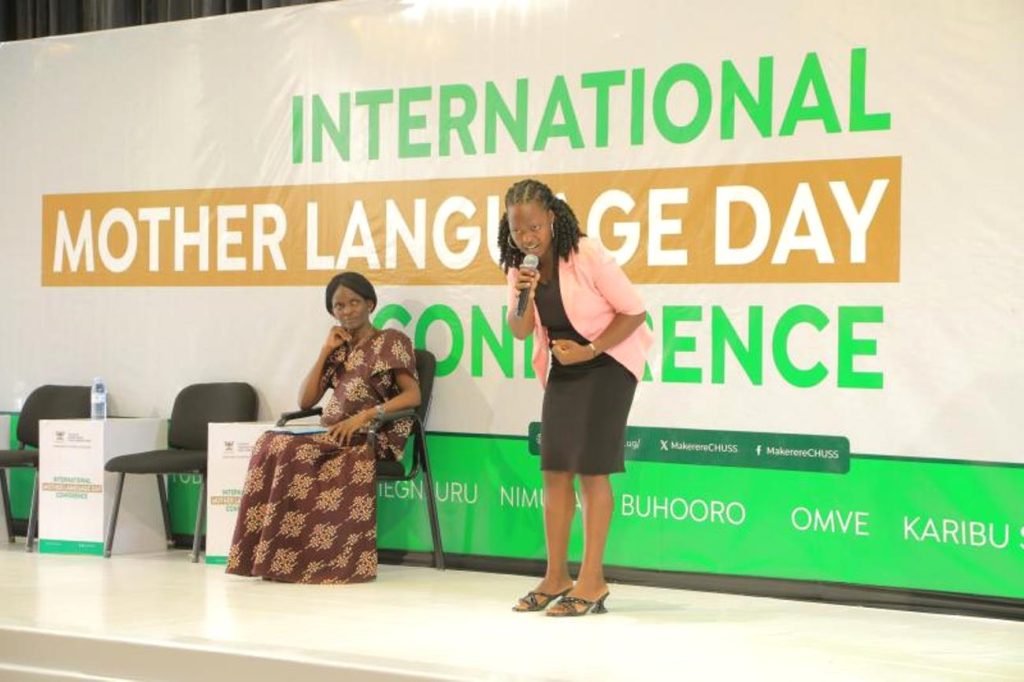
Just from our myths, Prof. Namyalo highlighted that the Baganda are related to the Bagisu, and the Bagisu are related to the Basamia, Banyole, and the entire Luhya community in Eastern Kenya. Their language intelligibility attests to this. The Bagisu are linguistically and culturally related to the Bakonzo, who are related to the mountainous Bakiga. The Bakonzo are 1 million people in Uganda, while their kin are over 6 million in Eastern DRC called the Bayira (this is just one example of the colonial border problems).
The kin of the Bamasaba: The Baganda (Via the myth of Kintu/Kuntu) are linked to the Banyoro, the Banyoro are connected to the Batooro and Banyankole- Bakiga, and Banyarwanda because they all belong to the Kitara empire and their cattle keeping and agricultural practices demonstrate this. When Kitara disintegrated with the fall of the Bacwezi, the Biito Luos took over. There is a close linkage between the Luos and the Banyoro, especially, the ruling families in Bunyoro, Tooro, Buganda, Busoga, and Ankole are all of Luo origin. The Luos are cousins to the West Nilers, who have a close affinity to the Lango. The Lango are Luo in terms of language but, genetically and culturally, are linked to Itesots, Karamojongs, Masai, and Turkana.
Makerere to start teaching Advanced Lusoga, Ateso and other languages – Head Dept. of African Languages
The Conference Convener and Head of Department of African Languages Dr Gilbert Gumoshabe explained that department was established in 2012, having been part of the then Institute of Languages, which had also been part of the Department of Languages. At present, five degree subjects at undergraduate level namely; Luganda Advanced, Kiswahili Advanced, Kiswahili Beginners, Runyakitara Advanced and Luo Advanced are offered.
“We have proposed to start teaching Lusoga Advanced and Ateso Advanced. We believe these will be part of the subjects in the next admission in August 2024, as BA Arts is in the final stages of re-accreditation. The syllabus for Lugbarati Advanced is also in the final stages of development. Our mission is to ensure that all local languages taught at the secondary level in Uganda are also taught at the department”, Dr. Gumoshabe said
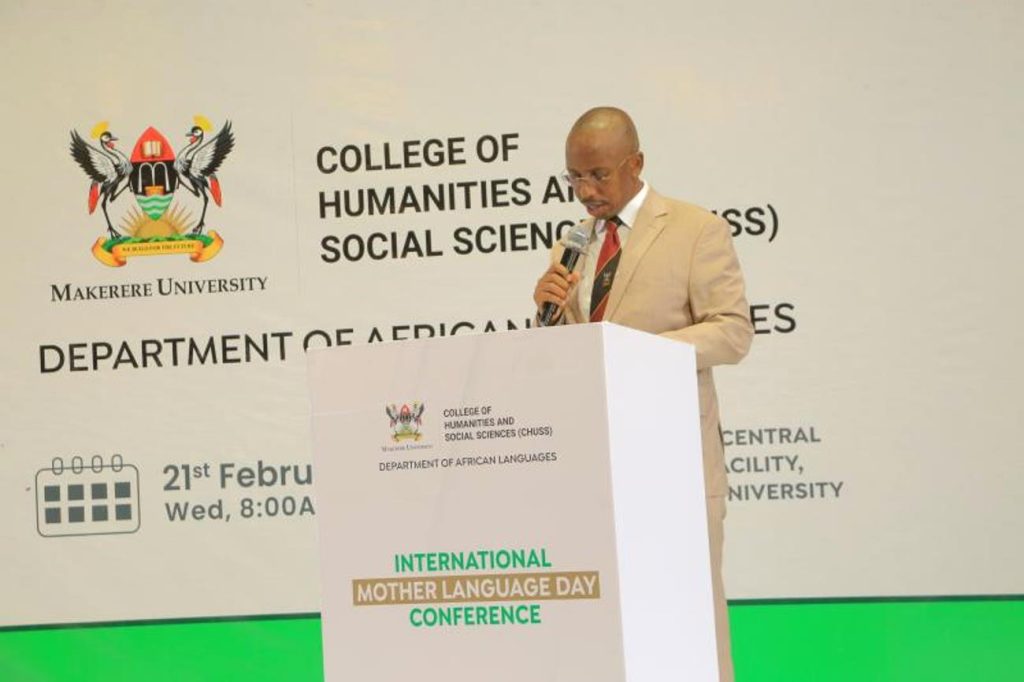
At the masters level, Dr. Gomushabe said , they have MA in African Languages. During the revision period, it was agreed to re-introduce MA in Luganda, MA in Kiswahili and MA in Runyakitara and to continue to develop indigenous languages as capacity is built. The department also offers PhD in African Languages by Research.
Dr. Gomushabe appreciated the persons who spearheaded the teaching of local languages especially Prof. Livingstone Walusimbi (RIP), Prof. Kasalina Matovu (RIP), Prof. Ruth Mukama, Prof. Oswald Ndoleriire, Prof. Manuel Muranga, Mrs. Shirley Byakutaga, Prof. Edith Natukunda and Ms. Jane Alowo.
At the level of staffing, the head reported that the department has 9 PhDs, and 5 registered PhD members of staff with one at the Associate Professor level. The students offering the subjects in African Languages are doing BA Arts, BA with education, BA Social Sciences. The department also service programs in the Colleges of Agriculture and Environmental Sciences, Computing and Information Sciences and Education and External Studies.
The Aim of the conference
Gumoshabe said the aim of the conference is to motivate discussion between national scholars and stakeholders of language and culture in Uganda and beyond.
“It is on this day that we celebrate cultural diversity and appreciate the sweetness in our mother tongue through cultural entertainment of different forms, presentations and discussions. It is through our mother tongue that we can preserve our cultural heritage. This is a God-given gift that we should never lose”, he said
Mother language according the convener, is a natural heritage and a foundation of identity. He stressed that what is important is to embrace unity in diversity by respecting and promoting diverse languages as they are in the motherland Uganda and this will enable document indigenous knowledge systems to supplement what is got from other countries.
Even in the face of development, civilization and modernization, Gumoshabe stated that mother languages should never be forgotten on reason that , there is no country on record that has developed using a foreign language.
“All countries that have developed have started by indigenizing knowledge and a foreign language has supplemented their efforts. This applies to both populous and less populous countries”, Dr. Gumoshabe asserted,
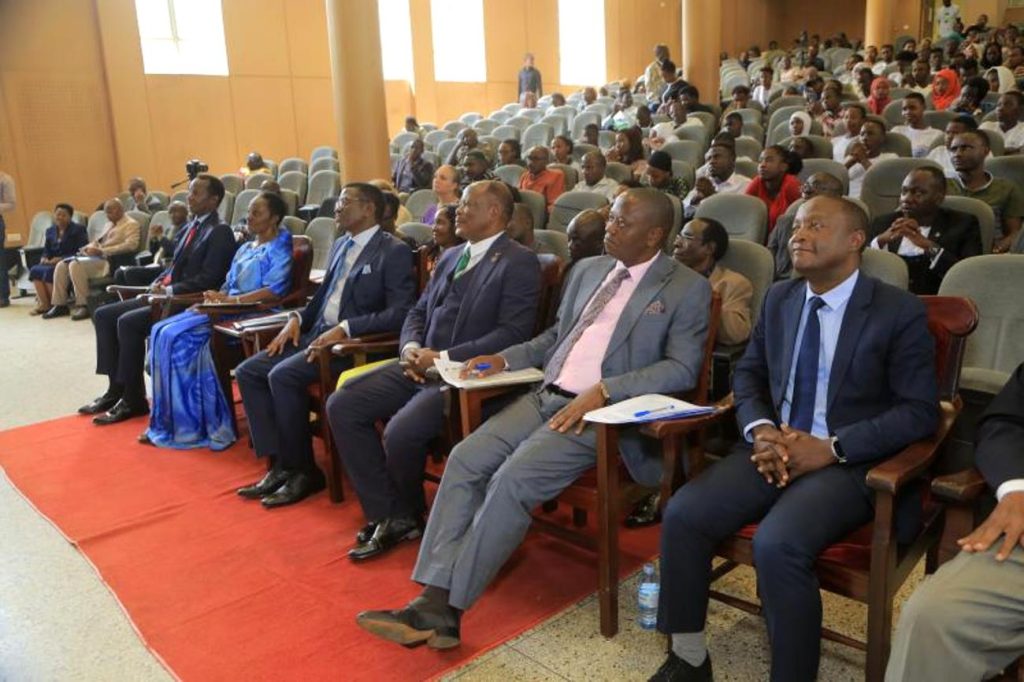
Gumoshabe cited Iceland with a population of 399,189 as of January 2024 that uses the Icelandic language as their official language. Since it has a small population, they would have used one of the European languages but they opt to use their indigenous language and their GDP per capita is $69,833.
He argued that, now that English is here to stay, all efforts should be put into developing mother languages and being multilingual. He added that, knowing four languages significantly increases chances of success in adulthood.
Dr. Gumoshabe extended gratitude to the college leadership for the tremendous support given for the success of this conference.
Gumoshabe thanked Keynote speakers, Prof. Manuel Muranga and Mr. Richard Nzogi and the panelists, for accepting for honoring the invitation and sharing their expertise and experiences..He also appreciated the Organizing Committee for this Conference headed by Dr Fridah Katushemererwe together with the different student associations especially Nkobazamboggo spearheaded by Mr Adrian Lubyayi, for tireless efforts in making this day colourful.
Finally, the convener thanked the Centre for Languages and Communication Services, the Principal, College of Humanities and Social Sciences and the Vice Chancellor, for the financial support that has made this day successful.
You may like
-


Simplicity, Service & Scholarship: Hallmarks of Professor Livingstone Luboobi’s Legacy
-


EfD-Mak Holds 2nd Advisory Board Meeting: Charts Path for Growth
-


Public University Legal and Accounting Officers Trained on Governance and Compliance
-


Celebrating the Life of Prof. Livingstone Sserwadda Luboobi
-


Fare Thee Well Prof. Luboobi
-


Strengthening Grants Management Through Institutional Collaboration and Capacity Building
General
Diploma in Performing Arts Admission List 2025/26
Published
2 weeks agoon
July 4, 2025By
Mak Editor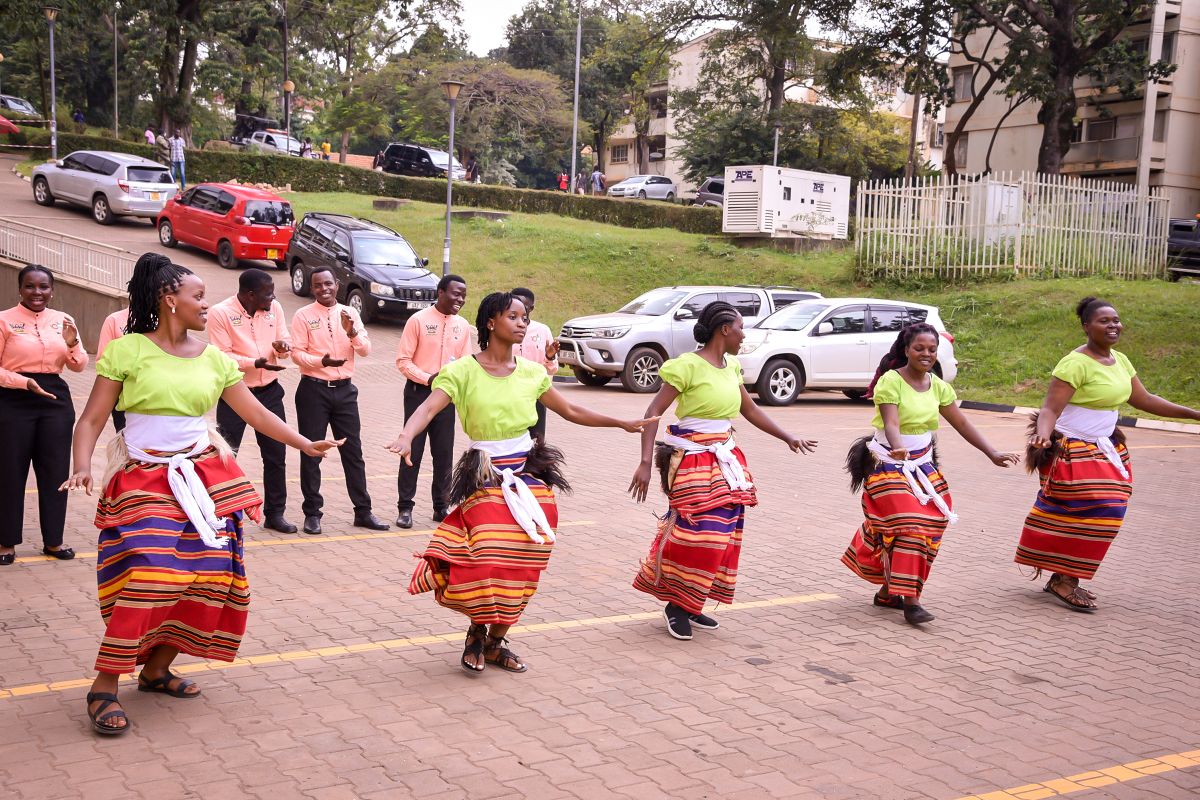
The Office of Academic Registrar, Makerere University has released the admission list of candidates who passed the special entry examinations for the Diploma in Performing Arts held on Saturday 17th May, 2025
The following have been admitted by the University’s Admissions Committee on Private Sponsorship for the 2025/26 Academic Year
General
Special Exam Results -Diploma in Performing Arts 2025/26
Published
3 weeks agoon
June 28, 2025By
Mak Editor
The results for the 2025/2026 special entry examination for the Diploma in Performing Arts held on Saturday 17th May, 2025. Candidates who scored a final mark of 50% and above passed the Examination and have been recommended to the university’s Admissions Committee for consideration.
Humanities & Social Sciences
CHUSS Graduate Symposium Showcases Research and Fosters Collaboration
Published
4 weeks agoon
June 20, 2025By
Mak Editor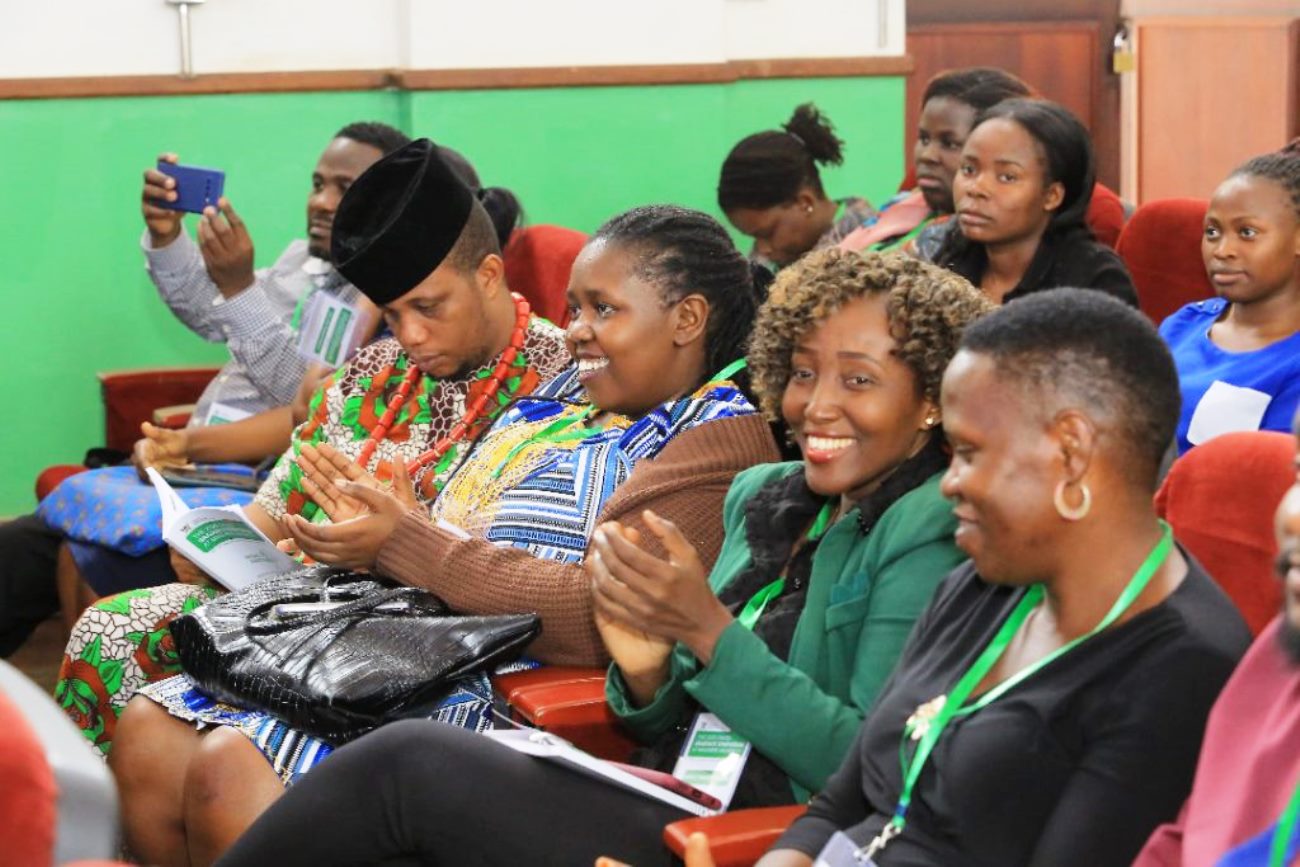
By Atwenda Nancy. E
Makerere University, June 20, 2025 — The College of Humanities and Social Sciences (CHUSS) is holding its 2025 Graduate Symposium from June 19 – 21, 2025, bringing together scholars, mentors, and graduate students in a spirited exchange of ideas, research, and academic collaboration.
The symposium, hosted at Makerere University, has provided a dynamic platform for PhD students to present their ongoing research, while also strengthening ties with sister universities and celebrating the achievements of the CHUSS Graduate School in nurturing the next generation of scholars.
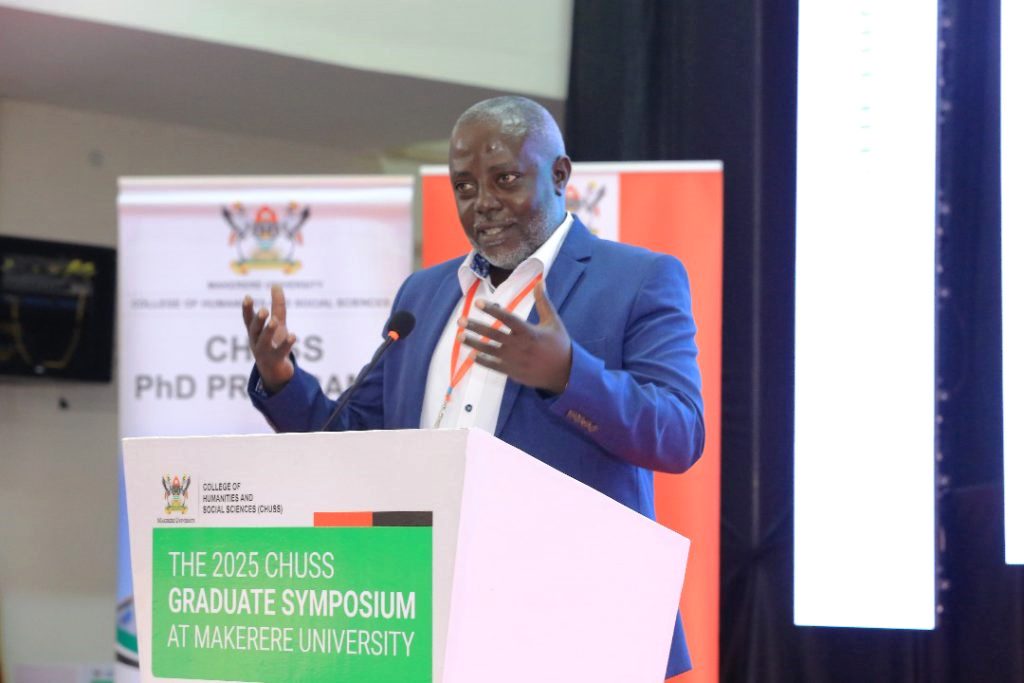
In his keynote address, Dr. Edgar Fred Nabutanyi welcomed participants and acknowledged the contributions of speakers from the previous day’s sessions, including Prof. Eric Awich Ochen (Deputy Principal, CHUSS), Dr. Peter Wekesa, and Dr. Zaid Sekito, among others. He emphasized that the symposium was not just a showcase of academic work, but a strategic platform to build partnerships and attract research funding.
“Generations must prepare for the next generation,” Dr. Nabutanyi noted, reflecting on life after PhD and the evolving role of Makerere University as a research-intensive institution. He praised department heads for their role in ensuring timely completion of graduate programmes and reiterated the college’s commitment to research excellence.
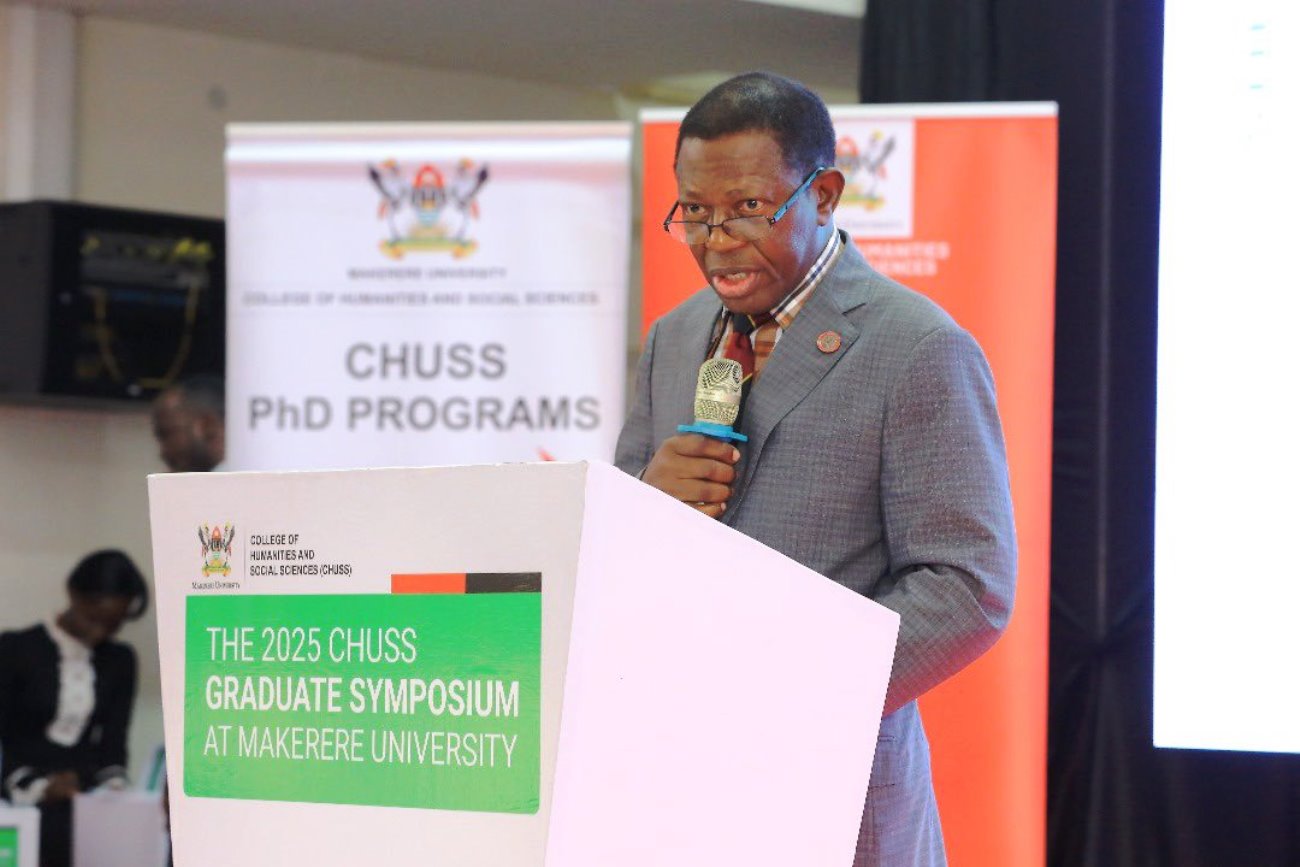
The event was officially opened by Prof. Buyinza Mukadasi, the Acting Deputy Vice Chancellor for Academic Affairs, who represented the Vice Chancellor, Prof. Barnabas Nawangwe. In his remarks, Prof. Buyinza highlighted the importance of research that is impactful and relevant to society.
“Research is unimportant unless it is relevant,” he stated. “If one conducts research that doesn’t benefit society, it becomes a waste of resources.” He urged graduate students to approach their academic work with purpose, noting that Makerere is not a “PhD factory” but a hub for innovation, with over 300 active PhD students registered.
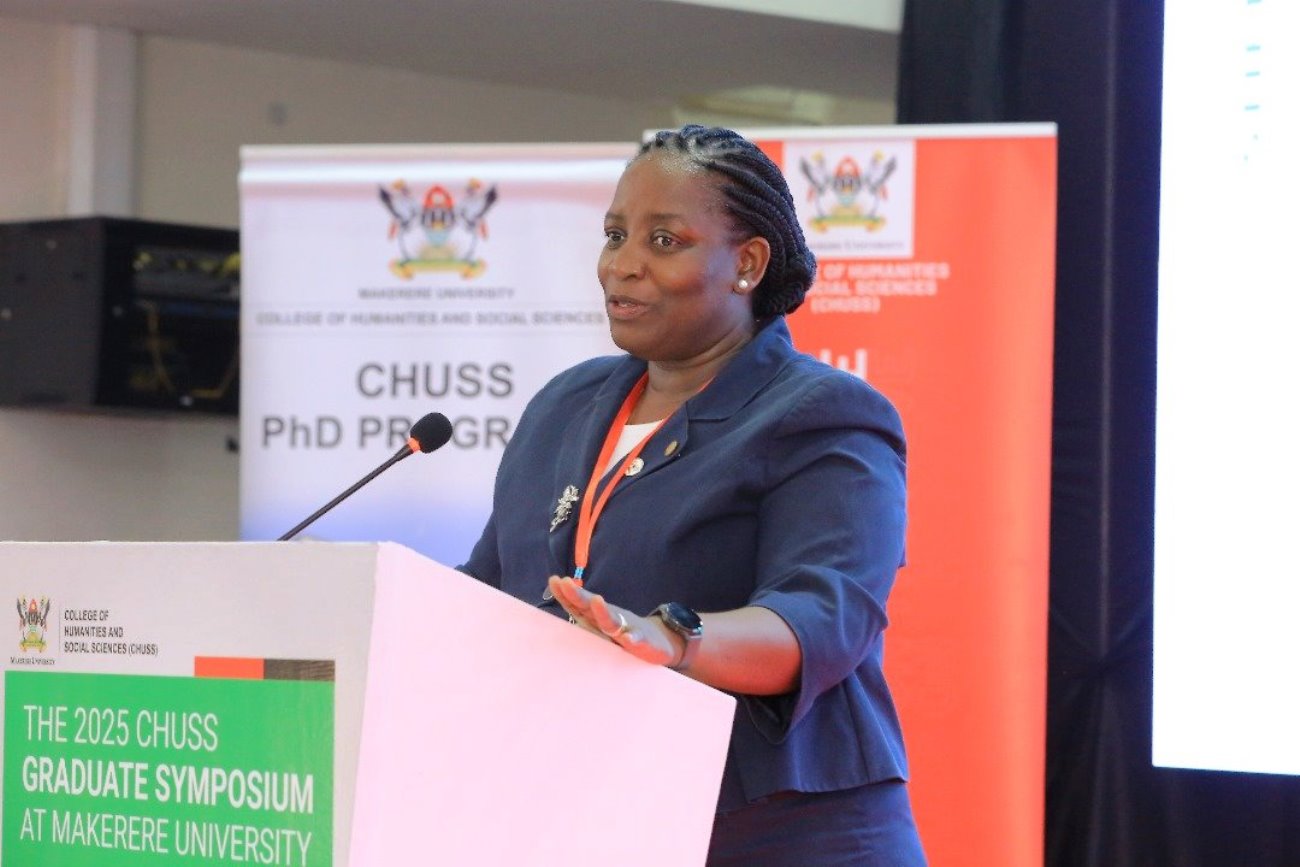
Prof. Helen Nambalirwa Nkabala, Principal of CHUSS, underscored the College’s intentional approach to graduate success. “You are in the mind of an excellent mind,” she said, encouraging students to continue striving for excellence and leadership in their respective fields. The 2025 CHUSS Graduate Symposium served as both a celebration of academic progress and a call to action for scholars to engage in meaningful research that addresses the needs of communities and contributes to national and global development.
The Writer is an Intern in the Public Relations Office, Makerere University
Trending
-

 General2 weeks ago
General2 weeks agoRe-advert: Admission to Undergraduate Programmes 2025/2026
-

 General1 week ago
General1 week agoRe-Advert for Applications for Diploma and Certificate Training
-

 General5 days ago
General5 days agoMakerere University Fees Waiver for 40 First Year Female Students 2025/2026
-

 General2 weeks ago
General2 weeks agoPress Statement on Ranking
-

 Health1 week ago
Health1 week agoCall for Applications: Responsible Conduct of Research (RCR) Training Course
